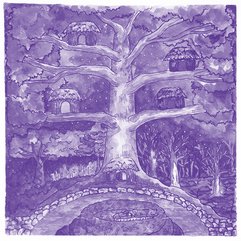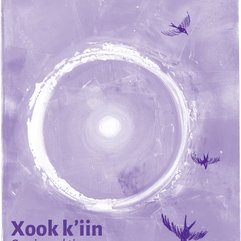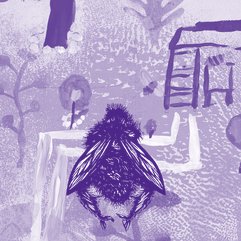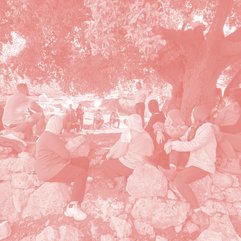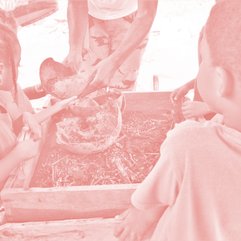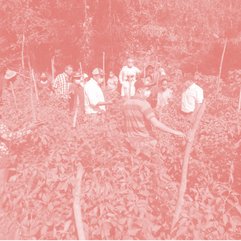Once There Were Commons
Film screening and conversation with Barbara Marcel, Júlio do Carmo Gomes and Marco Araújo.
19.00-22.00
Save the Date
all ages welcome
in English/in French/in Portuguese

In a seemingly suspended space and time, all land was held in common. Some remain part of the commons––and more could be reclaimed to the commons. The deeper the sense of belonging to a land, the deeper the strength and willingness to care for and defend it. Yet, men’s pervasive violence upon the environment keeps haunting us: concerns regarding the extensive lithium mining proposed for the mountainous regions of the north of Portugal, mining activities in the southwest of Brazil and in northern France, eroded mountains and disturbed biodiversity. Finally, a common land in South England traversed with wonder, reminding us of the Diggers who wished to hold “all things in common.”
Quando a terra foge / When the Land Runs Away
(Frederico Lobo, Portugal, 2024, 30 min, Original version with English subtitles)
Amid the fog and the labyrinth of time, while machines probe the geological depths of the mountain, a shepherd searches for an errant cow. Childhood finds its way back, the mountain transforms itself, the cycle continues.
Olhe bem as Montanhas / Look Closely at the Mountains
(Ana Vaz, Brazil, France, 2018, 30 min, Original version with English subtitles)
« Look closely at the mountains! »: the phrase was coined by artist Manfredo de Souzanetto during Brazil’s years of dictatorship. Mining activities were destroying the environment in the state of Minas Gerais in the southwest of the country. Through editing, Ana Vaz draws parallels between this region and the very distant Nord-Pas-de-Calais in northern France, also marked by over three centuries of mining. On one side, eroded mountains plague its inhabitants with deadly landslides. Hollow and gutted, these mountains become the receptacles of a ghostly memory. On the other side, in France, mining waste stacks become mountains and reservoirs of biodiversity, where the threshold between nature and technology becomes indiscernible.
Black Pond
(Sarah Jessica Rinland, UK, 2018, 42 min, Original version with English subtitles)
Black Pond explores the activity within a common land in South England. Previously occupied by the 17th century agrarian socialists, the Diggers, the land is currently inhabited by a Natural History Society whose occupations include bat and moth trapping, mycology, tree measuring, and botanical walks. After two years of filming on the land, the footage was shown to the members of the Society. Their memories and responses were recorded and subsequently used as part of the film’s narration. The film intimately explores human’s relationship with and within land and nature.
Speakers’ Biographies
Barbara Marcel is a visual artist, filmmaker, curator and researcher interested in the cultural roots of nature, in the epistemological crossroads between Brazil and Germany, and in the various colonialities that to this day extractively pervades the territory of Latin America. Marcel graduated in Film Studies in Rio de Janeiro, holds an MA from the Art in Context Institute at the Universität der Künste Berlin (UdK) and was a PhD candidate at the Bauhaus-Universität Weimar between 2015-2021 as a research fellow of the Heinrich Böll Foundation. Parallel to her individual research, she works regularly with other artists, researchers and activists on projects around ecological relations and processes of thought and practice in times of environmental collapse and increasing social inequalities.
Júlio do Carmo Gomes (1976, Serra das Alhadas, Figueira da Foz) is an editor, translator and journalist. He published the play Urro/Gebrüll (7 Nós & Oficina Arara, 2021), a monologue that premiered at the historic Volksbühne in Berlin (2015 and 2021) and was later staged in Portugal (2017 and 2021). In 2022, Editora Devires (Brazil) included his essay “Uma heresia contra o humanismo - chocalheiros e candomblecistas em devires neo-animistas” in the book Enviadescer a Decolonialidade. He founded the magazine Utopie - Magazin für Sinn und Verstand in Berlin. In the German capital, he has published poetry, essays and fiction in the magazine Stadtsprachen. He collaborates regularly with the newspaper Mapa and the magazine Flauta de Luz.
These projects and fragments of his career owe a lot to the roots of Gato Vadio, the bookshop that JCG founded in 2007 and which is still open in Porto. In 2025, a co-edition of Flauta de Luz & Cornuda Radiante brought to print his book of short stories Liberne, Histórias dos Montes Baldios, an iconic fictional rescue of the culture of the commons in the Gerês mountains, in northern Portugal.
Marco Araújo was born in a small village in the mountains of northern Portugal, a place with deep traditions of communal life. From a young age, he developed a strong fascination with the natural world — particularly fungi and medicinal plants. The forest quickly became both a refuge and a place of learning. He spend much of his time outdoors, collecting plants and mushrooms, fishing, and exploring remote areas. Over the past seven years, he has also been involved in resisting lithium mining projects in northern Portugal, especially in the nearby Barroso region. He maintains a blog where he shares reflections and ideas with friends.
This event is part of the film series The Land is Whispering: Imagine Otherwise!. You can find the whole program here: The Land is Whispering - Program.




